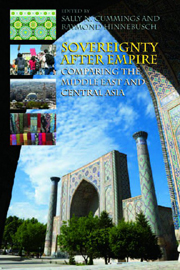Book contents
- Frontmatter
- Contents
- Acknowledgments
- Notes on the Contributors
- 1 Introduction
- SECTION I Histories of Empire and After
- SECTION II Paths to Sovereignty: Views from the Core and Periphery
- SECTION III Empire and Domestic Sovereignty
- 8 The Middle East after Empire: Sovereignty and Institutions
- 9 Sovereignty after Empire: The Colonial Roots of Central Asian Authoritarianism
- SECTION IV Empire and Popular Sovereignty
- SECTION V Empire and External Sovereignty
- Bibliography
- Index
9 - Sovereignty after Empire: The Colonial Roots of Central Asian Authoritarianism
from SECTION III - Empire and Domestic Sovereignty
Published online by Cambridge University Press: 12 September 2012
- Frontmatter
- Contents
- Acknowledgments
- Notes on the Contributors
- 1 Introduction
- SECTION I Histories of Empire and After
- SECTION II Paths to Sovereignty: Views from the Core and Periphery
- SECTION III Empire and Domestic Sovereignty
- 8 The Middle East after Empire: Sovereignty and Institutions
- 9 Sovereignty after Empire: The Colonial Roots of Central Asian Authoritarianism
- SECTION IV Empire and Popular Sovereignty
- SECTION V Empire and External Sovereignty
- Bibliography
- Index
Summary
Central Asian states achieved independence during a period when there was widespread support for liberal-democratic norms throughout the international system, but all five states in the region nevertheless developed primarily authoritarian forms of government. In two cases – Uzbekistan and Turkmenistan – extreme authoritarian regimes emerged, which have faced international censure for their abuses of civil liberties and human rights. Some initial political pluralism in Kyrgyzstan in the 1990s contracted significantly in the first decade of the twenty-first century. Kazakhstan mixed central authoritarian control and neo-patrimonial dynamics with economic progress and relatively liberal social norms. In Tajikistan power became increasingly centralized in the hands of the president after the end of the civil war in the late 1990s.
Popular explanations for the dominance of authoritarian political systems in Central Asia after independence have tended to rely on the actions or beliefs of particular political leaders, the various cultural attributes ascribed to particular peoples or ethnic groups, the contingency of particular historical events or the policies of external powers and international organizations active in the region. These explanations all echo wider theoretical positions in the literature on democratization, but the scholarly debate on democratization and authoritarianism in Central Asia has perhaps underplayed some factors that have been seen as critical in other regions which have faced similarly persistent authoritarian regimes. In the African context, for example, a complex debate continues about the legacy of colonialism and the dominance of non-democratic regimes in the continent.
- Type
- Chapter
- Information
- Sovereignty after EmpireComparing the Middle East and Central Asia, pp. 178 - 196Publisher: Edinburgh University PressPrint publication year: 2011



